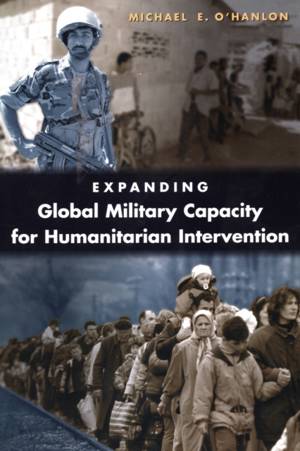
- Afhalen na 1 uur in een winkel met voorraad
- Gratis thuislevering in België vanaf € 30
- Ruim aanbod met 7 miljoen producten
- Afhalen na 1 uur in een winkel met voorraad
- Gratis thuislevering in België vanaf € 30
- Ruim aanbod met 7 miljoen producten
Zoeken
Expanding Global Military Capacity for Humanitarian Intervention
Michael E O'Hanlon
Paperback | Engels
€ 44,45
+ 88 punten
Uitvoering
Omschrijving
Humanitarian military intervention and muscular peace operations have been partially effective in recent years in saving thousands of lives from the Balkans to Haiti to Somalia to Cambodia to Mozambique. However, success has often been mitigated by the international community's unwillingness or inability to quickly send enough forces capable of dealing with a situation decisively. In other cases, the international community has essentially stood aside as massive but possibly preventable humanitarian tragedies took place -- for instance, in Angola and Rwanda in the mid-1990s and in Congo as this book goes to press. Sometimes these failures have simply been the result of an insufficient pool of available military and police forces to conduct the needed intervention or stabilization missions. In this timely new book, Michael O'Hanlon presents a blueprint for developing sufficient global intervention capacity to save many more lives with force. He contends, at least for now, that individual countries rather than the United Nations should develop the aggregate capacity to address several crises of varying scale and severity, and that many more countries should share in the effort. The United States' role is twofold: it must make slight redesigns to its own military and, even more important, encourage other nations to join it in this type of intervention, including training and support of troops in countries, such as those in Africa, that are willing to take the necessary steps to prevent humanitarian disaster but lack the resources.
Specificaties
Betrokkenen
- Auteur(s):
- Uitgeverij:
Inhoud
- Aantal bladzijden:
- 168
- Taal:
- Engels
Eigenschappen
- Productcode (EAN):
- 9780815764410
- Verschijningsdatum:
- 21/01/2003
- Uitvoering:
- Paperback
- Formaat:
- Trade paperback (VS)
- Afmetingen:
- 155 mm x 233 mm
- Gewicht:
- 231 g

Alleen bij Standaard Boekhandel
+ 88 punten op je klantenkaart van Standaard Boekhandel
Beoordelingen
We publiceren alleen reviews die voldoen aan de voorwaarden voor reviews. Bekijk onze voorwaarden voor reviews.







